University Healthcare: Cultural Safety in Healthcare Report
VerifiedAdded on 2021/04/24
|9
|1840
|45
Report
AI Summary
This report delves into the critical concept of cultural safety within healthcare, emphasizing the importance of cultural competence in a globalized world. It defines cultural competence as the ability to effectively communicate and interact with individuals from diverse cultural backgrounds, particularly in healthcare settings. The report examines the role of healthcare practitioners in providing culturally sensitive services, highlighting the need for self-reflection on personal cultural beliefs and values to enhance cross-cultural interactions. It recommends cultural competency training for healthcare providers and acknowledges the impact of cultural diversity on healthcare practices. The author reflects on their upbringing and how personal values like honesty and respect will contribute to their practice, while also addressing potential challenges related to adaptability. The report further discusses the significance of health literacy and the need for inclusive healthcare practices, especially for vulnerable populations. It addresses potential conflicts between personal beliefs and cultural practices, such as gender equality and religious beliefs, and highlights the importance of seeking guidance and developing professionalism to navigate sensitive situations. The conclusion underscores the importance of respect and competence in healthcare, emphasizing the author's commitment to continuous learning and improvement to become a culturally safe practitioner.
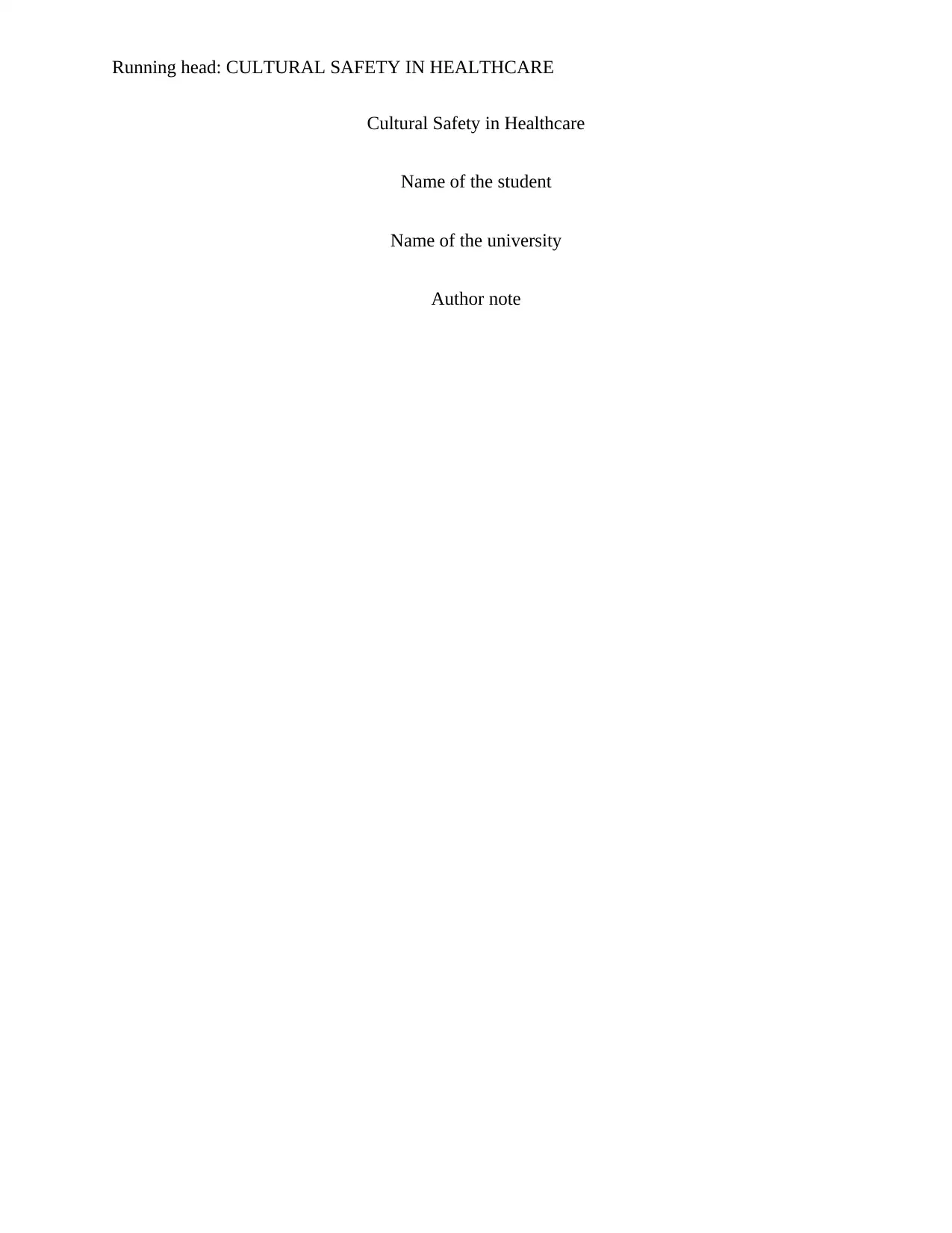
Running head: CULTURAL SAFETY IN HEALTHCARE
Cultural Safety in Healthcare
Name of the student
Name of the university
Author note
Cultural Safety in Healthcare
Name of the student
Name of the university
Author note
Paraphrase This Document
Need a fresh take? Get an instant paraphrase of this document with our AI Paraphraser
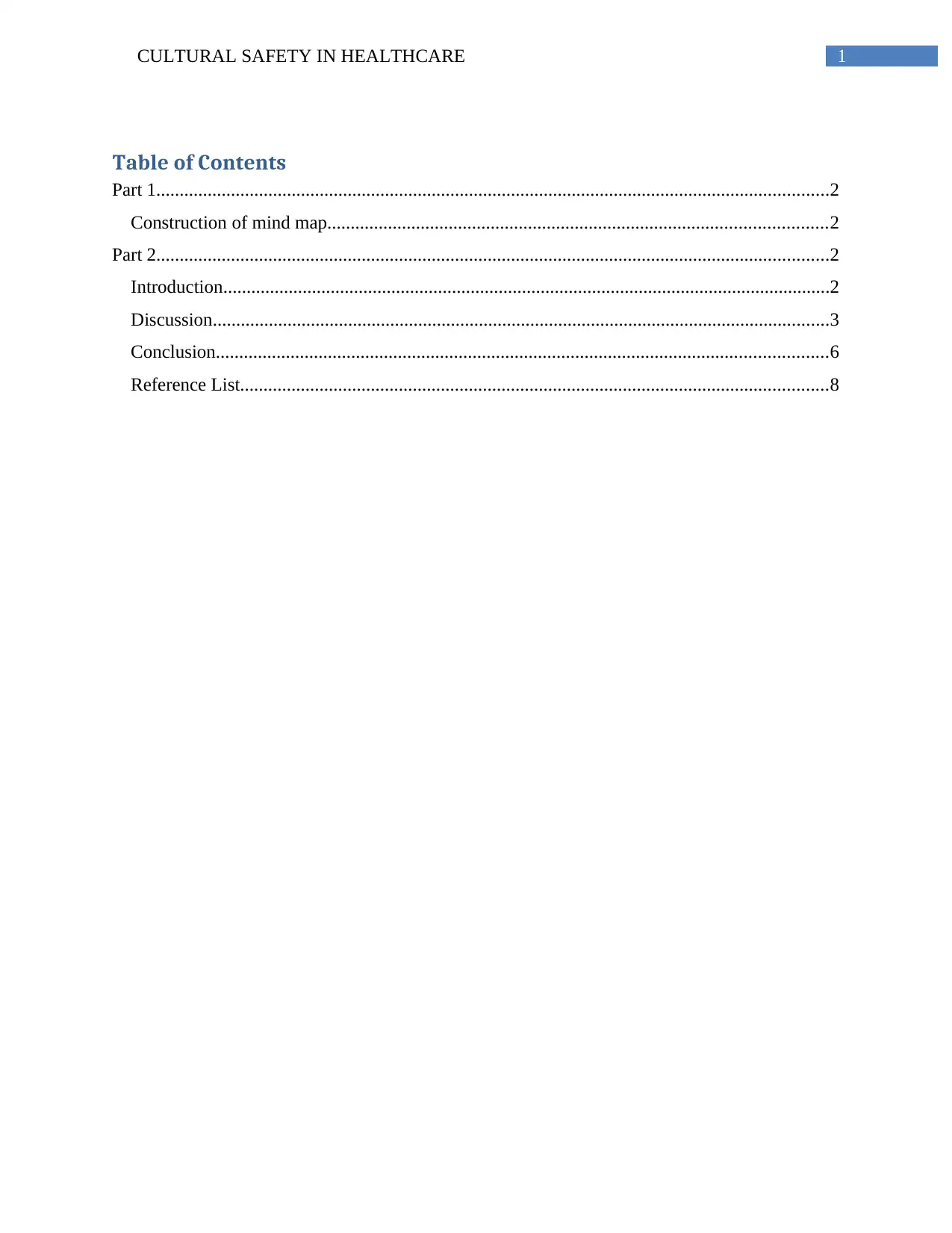
1CULTURAL SAFETY IN HEALTHCARE
Table of Contents
Part 1................................................................................................................................................2
Construction of mind map...........................................................................................................2
Part 2................................................................................................................................................2
Introduction..................................................................................................................................2
Discussion....................................................................................................................................3
Conclusion...................................................................................................................................6
Reference List..............................................................................................................................8
Table of Contents
Part 1................................................................................................................................................2
Construction of mind map...........................................................................................................2
Part 2................................................................................................................................................2
Introduction..................................................................................................................................2
Discussion....................................................................................................................................3
Conclusion...................................................................................................................................6
Reference List..............................................................................................................................8
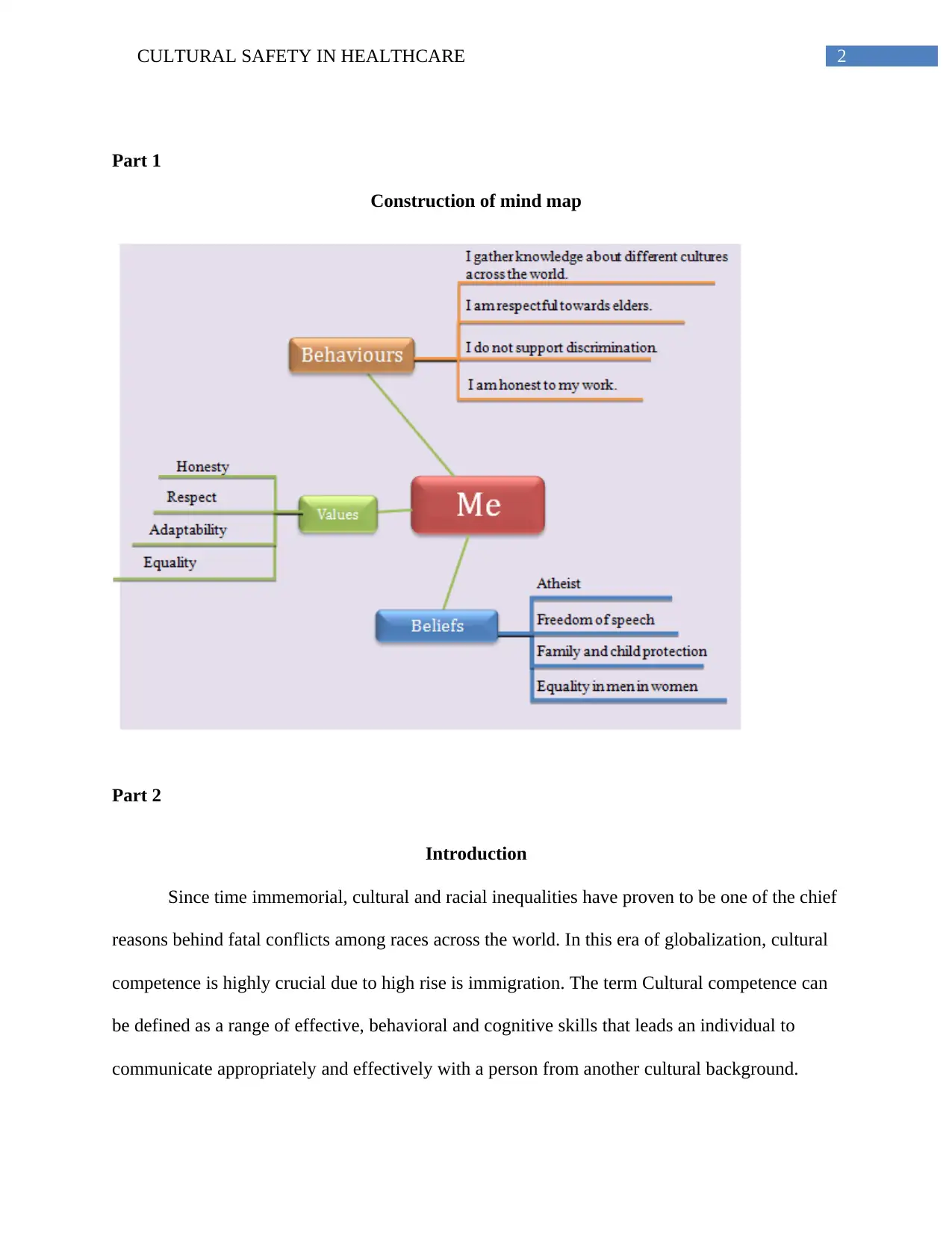
2CULTURAL SAFETY IN HEALTHCARE
Part 1
Construction of mind map
Part 2
Introduction
Since time immemorial, cultural and racial inequalities have proven to be one of the chief
reasons behind fatal conflicts among races across the world. In this era of globalization, cultural
competence is highly crucial due to high rise is immigration. The term Cultural competence can
be defined as a range of effective, behavioral and cognitive skills that leads an individual to
communicate appropriately and effectively with a person from another cultural background.
Part 1
Construction of mind map
Part 2
Introduction
Since time immemorial, cultural and racial inequalities have proven to be one of the chief
reasons behind fatal conflicts among races across the world. In this era of globalization, cultural
competence is highly crucial due to high rise is immigration. The term Cultural competence can
be defined as a range of effective, behavioral and cognitive skills that leads an individual to
communicate appropriately and effectively with a person from another cultural background.
⊘ This is a preview!⊘
Do you want full access?
Subscribe today to unlock all pages.

Trusted by 1+ million students worldwide
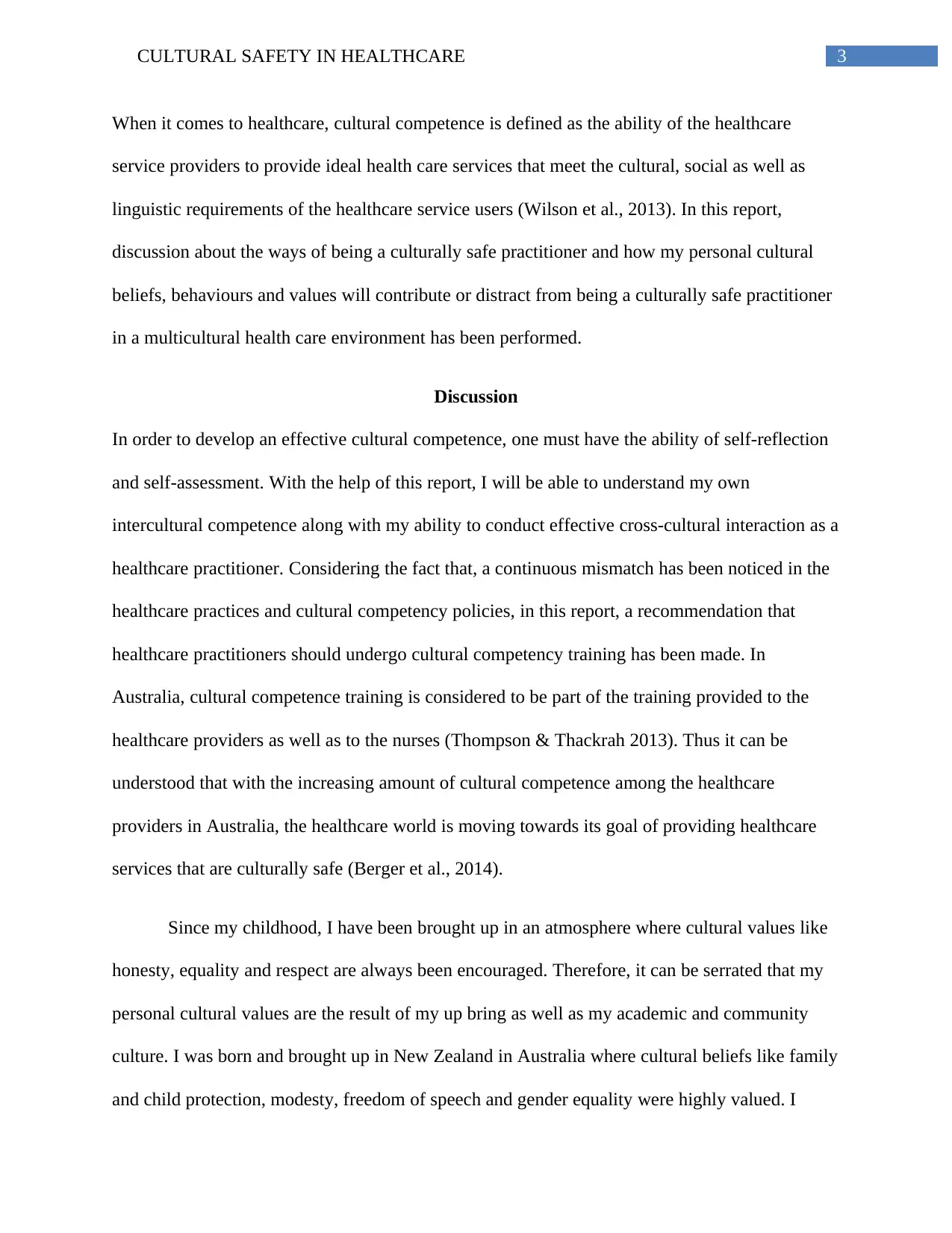
3CULTURAL SAFETY IN HEALTHCARE
When it comes to healthcare, cultural competence is defined as the ability of the healthcare
service providers to provide ideal health care services that meet the cultural, social as well as
linguistic requirements of the healthcare service users (Wilson et al., 2013). In this report,
discussion about the ways of being a culturally safe practitioner and how my personal cultural
beliefs, behaviours and values will contribute or distract from being a culturally safe practitioner
in a multicultural health care environment has been performed.
Discussion
In order to develop an effective cultural competence, one must have the ability of self-reflection
and self-assessment. With the help of this report, I will be able to understand my own
intercultural competence along with my ability to conduct effective cross-cultural interaction as a
healthcare practitioner. Considering the fact that, a continuous mismatch has been noticed in the
healthcare practices and cultural competency policies, in this report, a recommendation that
healthcare practitioners should undergo cultural competency training has been made. In
Australia, cultural competence training is considered to be part of the training provided to the
healthcare providers as well as to the nurses (Thompson & Thackrah 2013). Thus it can be
understood that with the increasing amount of cultural competence among the healthcare
providers in Australia, the healthcare world is moving towards its goal of providing healthcare
services that are culturally safe (Berger et al., 2014).
Since my childhood, I have been brought up in an atmosphere where cultural values like
honesty, equality and respect are always been encouraged. Therefore, it can be serrated that my
personal cultural values are the result of my up bring as well as my academic and community
culture. I was born and brought up in New Zealand in Australia where cultural beliefs like family
and child protection, modesty, freedom of speech and gender equality were highly valued. I
When it comes to healthcare, cultural competence is defined as the ability of the healthcare
service providers to provide ideal health care services that meet the cultural, social as well as
linguistic requirements of the healthcare service users (Wilson et al., 2013). In this report,
discussion about the ways of being a culturally safe practitioner and how my personal cultural
beliefs, behaviours and values will contribute or distract from being a culturally safe practitioner
in a multicultural health care environment has been performed.
Discussion
In order to develop an effective cultural competence, one must have the ability of self-reflection
and self-assessment. With the help of this report, I will be able to understand my own
intercultural competence along with my ability to conduct effective cross-cultural interaction as a
healthcare practitioner. Considering the fact that, a continuous mismatch has been noticed in the
healthcare practices and cultural competency policies, in this report, a recommendation that
healthcare practitioners should undergo cultural competency training has been made. In
Australia, cultural competence training is considered to be part of the training provided to the
healthcare providers as well as to the nurses (Thompson & Thackrah 2013). Thus it can be
understood that with the increasing amount of cultural competence among the healthcare
providers in Australia, the healthcare world is moving towards its goal of providing healthcare
services that are culturally safe (Berger et al., 2014).
Since my childhood, I have been brought up in an atmosphere where cultural values like
honesty, equality and respect are always been encouraged. Therefore, it can be serrated that my
personal cultural values are the result of my up bring as well as my academic and community
culture. I was born and brought up in New Zealand in Australia where cultural beliefs like family
and child protection, modesty, freedom of speech and gender equality were highly valued. I
Paraphrase This Document
Need a fresh take? Get an instant paraphrase of this document with our AI Paraphraser
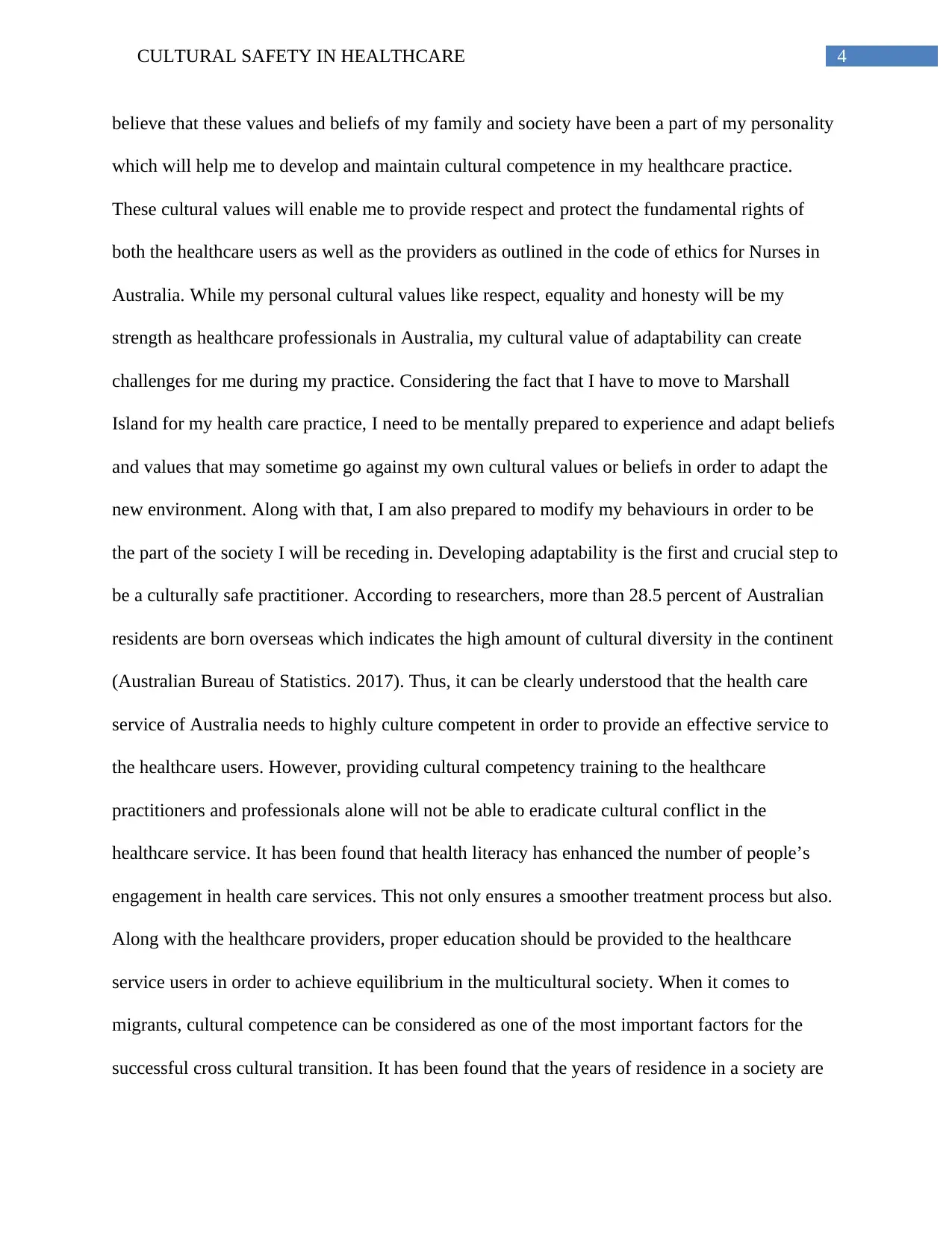
4CULTURAL SAFETY IN HEALTHCARE
believe that these values and beliefs of my family and society have been a part of my personality
which will help me to develop and maintain cultural competence in my healthcare practice.
These cultural values will enable me to provide respect and protect the fundamental rights of
both the healthcare users as well as the providers as outlined in the code of ethics for Nurses in
Australia. While my personal cultural values like respect, equality and honesty will be my
strength as healthcare professionals in Australia, my cultural value of adaptability can create
challenges for me during my practice. Considering the fact that I have to move to Marshall
Island for my health care practice, I need to be mentally prepared to experience and adapt beliefs
and values that may sometime go against my own cultural values or beliefs in order to adapt the
new environment. Along with that, I am also prepared to modify my behaviours in order to be
the part of the society I will be receding in. Developing adaptability is the first and crucial step to
be a culturally safe practitioner. According to researchers, more than 28.5 percent of Australian
residents are born overseas which indicates the high amount of cultural diversity in the continent
(Australian Bureau of Statistics. 2017). Thus, it can be clearly understood that the health care
service of Australia needs to highly culture competent in order to provide an effective service to
the healthcare users. However, providing cultural competency training to the healthcare
practitioners and professionals alone will not be able to eradicate cultural conflict in the
healthcare service. It has been found that health literacy has enhanced the number of people’s
engagement in health care services. This not only ensures a smoother treatment process but also.
Along with the healthcare providers, proper education should be provided to the healthcare
service users in order to achieve equilibrium in the multicultural society. When it comes to
migrants, cultural competence can be considered as one of the most important factors for the
successful cross cultural transition. It has been found that the years of residence in a society are
believe that these values and beliefs of my family and society have been a part of my personality
which will help me to develop and maintain cultural competence in my healthcare practice.
These cultural values will enable me to provide respect and protect the fundamental rights of
both the healthcare users as well as the providers as outlined in the code of ethics for Nurses in
Australia. While my personal cultural values like respect, equality and honesty will be my
strength as healthcare professionals in Australia, my cultural value of adaptability can create
challenges for me during my practice. Considering the fact that I have to move to Marshall
Island for my health care practice, I need to be mentally prepared to experience and adapt beliefs
and values that may sometime go against my own cultural values or beliefs in order to adapt the
new environment. Along with that, I am also prepared to modify my behaviours in order to be
the part of the society I will be receding in. Developing adaptability is the first and crucial step to
be a culturally safe practitioner. According to researchers, more than 28.5 percent of Australian
residents are born overseas which indicates the high amount of cultural diversity in the continent
(Australian Bureau of Statistics. 2017). Thus, it can be clearly understood that the health care
service of Australia needs to highly culture competent in order to provide an effective service to
the healthcare users. However, providing cultural competency training to the healthcare
practitioners and professionals alone will not be able to eradicate cultural conflict in the
healthcare service. It has been found that health literacy has enhanced the number of people’s
engagement in health care services. This not only ensures a smoother treatment process but also.
Along with the healthcare providers, proper education should be provided to the healthcare
service users in order to achieve equilibrium in the multicultural society. When it comes to
migrants, cultural competence can be considered as one of the most important factors for the
successful cross cultural transition. It has been found that the years of residence in a society are
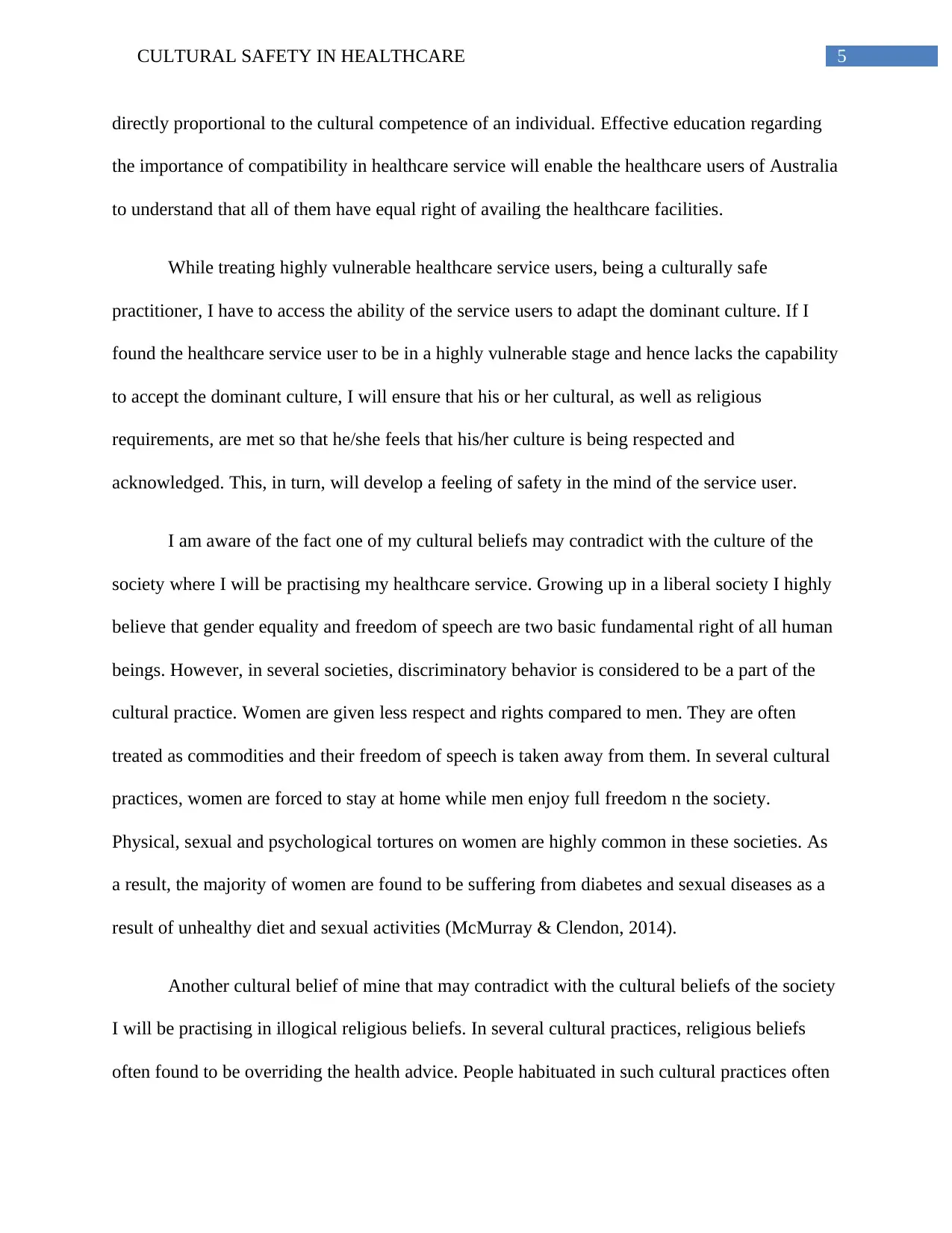
5CULTURAL SAFETY IN HEALTHCARE
directly proportional to the cultural competence of an individual. Effective education regarding
the importance of compatibility in healthcare service will enable the healthcare users of Australia
to understand that all of them have equal right of availing the healthcare facilities.
While treating highly vulnerable healthcare service users, being a culturally safe
practitioner, I have to access the ability of the service users to adapt the dominant culture. If I
found the healthcare service user to be in a highly vulnerable stage and hence lacks the capability
to accept the dominant culture, I will ensure that his or her cultural, as well as religious
requirements, are met so that he/she feels that his/her culture is being respected and
acknowledged. This, in turn, will develop a feeling of safety in the mind of the service user.
I am aware of the fact one of my cultural beliefs may contradict with the culture of the
society where I will be practising my healthcare service. Growing up in a liberal society I highly
believe that gender equality and freedom of speech are two basic fundamental right of all human
beings. However, in several societies, discriminatory behavior is considered to be a part of the
cultural practice. Women are given less respect and rights compared to men. They are often
treated as commodities and their freedom of speech is taken away from them. In several cultural
practices, women are forced to stay at home while men enjoy full freedom n the society.
Physical, sexual and psychological tortures on women are highly common in these societies. As
a result, the majority of women are found to be suffering from diabetes and sexual diseases as a
result of unhealthy diet and sexual activities (McMurray & Clendon, 2014).
Another cultural belief of mine that may contradict with the cultural beliefs of the society
I will be practising in illogical religious beliefs. In several cultural practices, religious beliefs
often found to be overriding the health advice. People habituated in such cultural practices often
directly proportional to the cultural competence of an individual. Effective education regarding
the importance of compatibility in healthcare service will enable the healthcare users of Australia
to understand that all of them have equal right of availing the healthcare facilities.
While treating highly vulnerable healthcare service users, being a culturally safe
practitioner, I have to access the ability of the service users to adapt the dominant culture. If I
found the healthcare service user to be in a highly vulnerable stage and hence lacks the capability
to accept the dominant culture, I will ensure that his or her cultural, as well as religious
requirements, are met so that he/she feels that his/her culture is being respected and
acknowledged. This, in turn, will develop a feeling of safety in the mind of the service user.
I am aware of the fact one of my cultural beliefs may contradict with the culture of the
society where I will be practising my healthcare service. Growing up in a liberal society I highly
believe that gender equality and freedom of speech are two basic fundamental right of all human
beings. However, in several societies, discriminatory behavior is considered to be a part of the
cultural practice. Women are given less respect and rights compared to men. They are often
treated as commodities and their freedom of speech is taken away from them. In several cultural
practices, women are forced to stay at home while men enjoy full freedom n the society.
Physical, sexual and psychological tortures on women are highly common in these societies. As
a result, the majority of women are found to be suffering from diabetes and sexual diseases as a
result of unhealthy diet and sexual activities (McMurray & Clendon, 2014).
Another cultural belief of mine that may contradict with the cultural beliefs of the society
I will be practising in illogical religious beliefs. In several cultural practices, religious beliefs
often found to be overriding the health advice. People habituated in such cultural practices often
⊘ This is a preview!⊘
Do you want full access?
Subscribe today to unlock all pages.

Trusted by 1+ million students worldwide
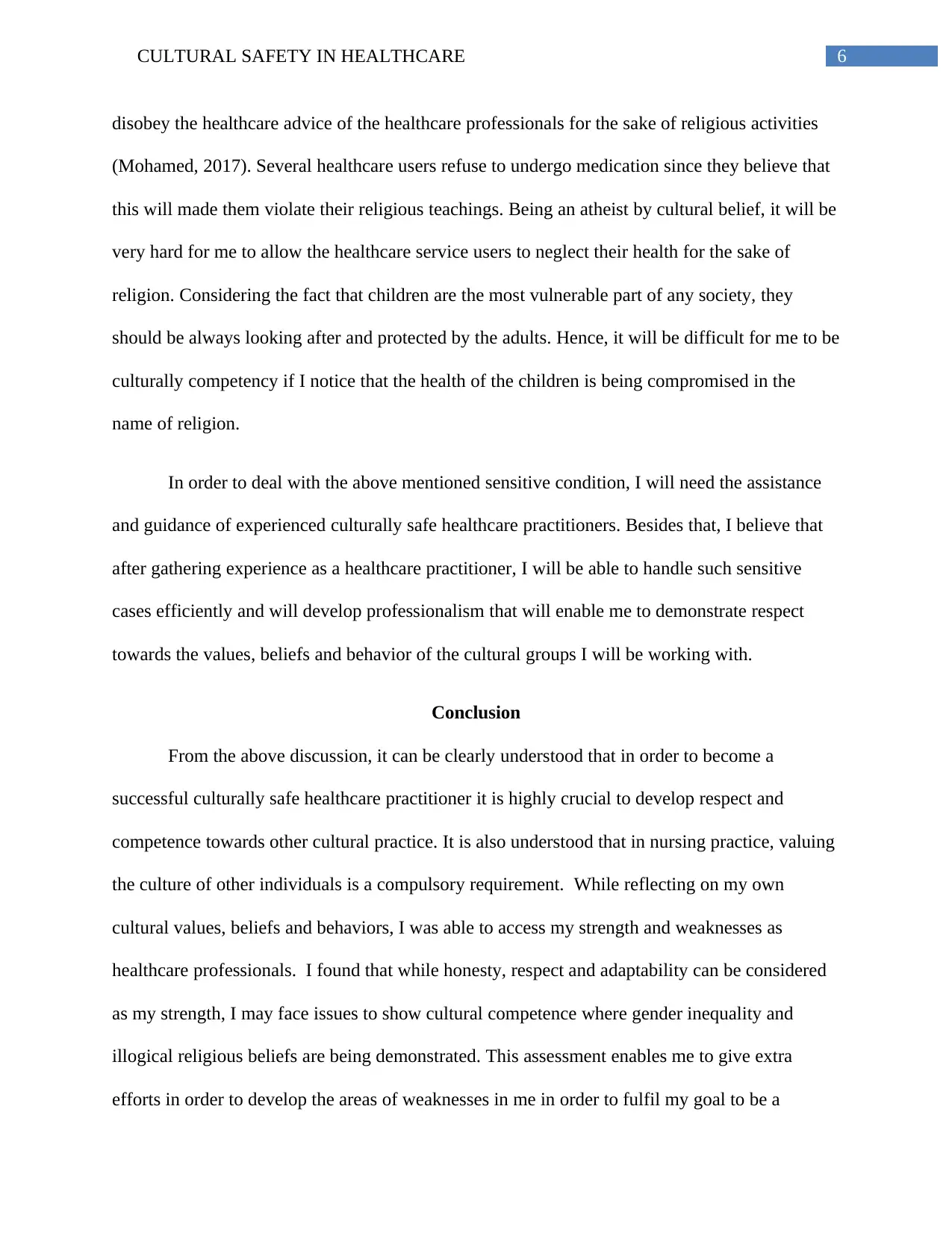
6CULTURAL SAFETY IN HEALTHCARE
disobey the healthcare advice of the healthcare professionals for the sake of religious activities
(Mohamed, 2017). Several healthcare users refuse to undergo medication since they believe that
this will made them violate their religious teachings. Being an atheist by cultural belief, it will be
very hard for me to allow the healthcare service users to neglect their health for the sake of
religion. Considering the fact that children are the most vulnerable part of any society, they
should be always looking after and protected by the adults. Hence, it will be difficult for me to be
culturally competency if I notice that the health of the children is being compromised in the
name of religion.
In order to deal with the above mentioned sensitive condition, I will need the assistance
and guidance of experienced culturally safe healthcare practitioners. Besides that, I believe that
after gathering experience as a healthcare practitioner, I will be able to handle such sensitive
cases efficiently and will develop professionalism that will enable me to demonstrate respect
towards the values, beliefs and behavior of the cultural groups I will be working with.
Conclusion
From the above discussion, it can be clearly understood that in order to become a
successful culturally safe healthcare practitioner it is highly crucial to develop respect and
competence towards other cultural practice. It is also understood that in nursing practice, valuing
the culture of other individuals is a compulsory requirement. While reflecting on my own
cultural values, beliefs and behaviors, I was able to access my strength and weaknesses as
healthcare professionals. I found that while honesty, respect and adaptability can be considered
as my strength, I may face issues to show cultural competence where gender inequality and
illogical religious beliefs are being demonstrated. This assessment enables me to give extra
efforts in order to develop the areas of weaknesses in me in order to fulfil my goal to be a
disobey the healthcare advice of the healthcare professionals for the sake of religious activities
(Mohamed, 2017). Several healthcare users refuse to undergo medication since they believe that
this will made them violate their religious teachings. Being an atheist by cultural belief, it will be
very hard for me to allow the healthcare service users to neglect their health for the sake of
religion. Considering the fact that children are the most vulnerable part of any society, they
should be always looking after and protected by the adults. Hence, it will be difficult for me to be
culturally competency if I notice that the health of the children is being compromised in the
name of religion.
In order to deal with the above mentioned sensitive condition, I will need the assistance
and guidance of experienced culturally safe healthcare practitioners. Besides that, I believe that
after gathering experience as a healthcare practitioner, I will be able to handle such sensitive
cases efficiently and will develop professionalism that will enable me to demonstrate respect
towards the values, beliefs and behavior of the cultural groups I will be working with.
Conclusion
From the above discussion, it can be clearly understood that in order to become a
successful culturally safe healthcare practitioner it is highly crucial to develop respect and
competence towards other cultural practice. It is also understood that in nursing practice, valuing
the culture of other individuals is a compulsory requirement. While reflecting on my own
cultural values, beliefs and behaviors, I was able to access my strength and weaknesses as
healthcare professionals. I found that while honesty, respect and adaptability can be considered
as my strength, I may face issues to show cultural competence where gender inequality and
illogical religious beliefs are being demonstrated. This assessment enables me to give extra
efforts in order to develop the areas of weaknesses in me in order to fulfil my goal to be a
Paraphrase This Document
Need a fresh take? Get an instant paraphrase of this document with our AI Paraphraser
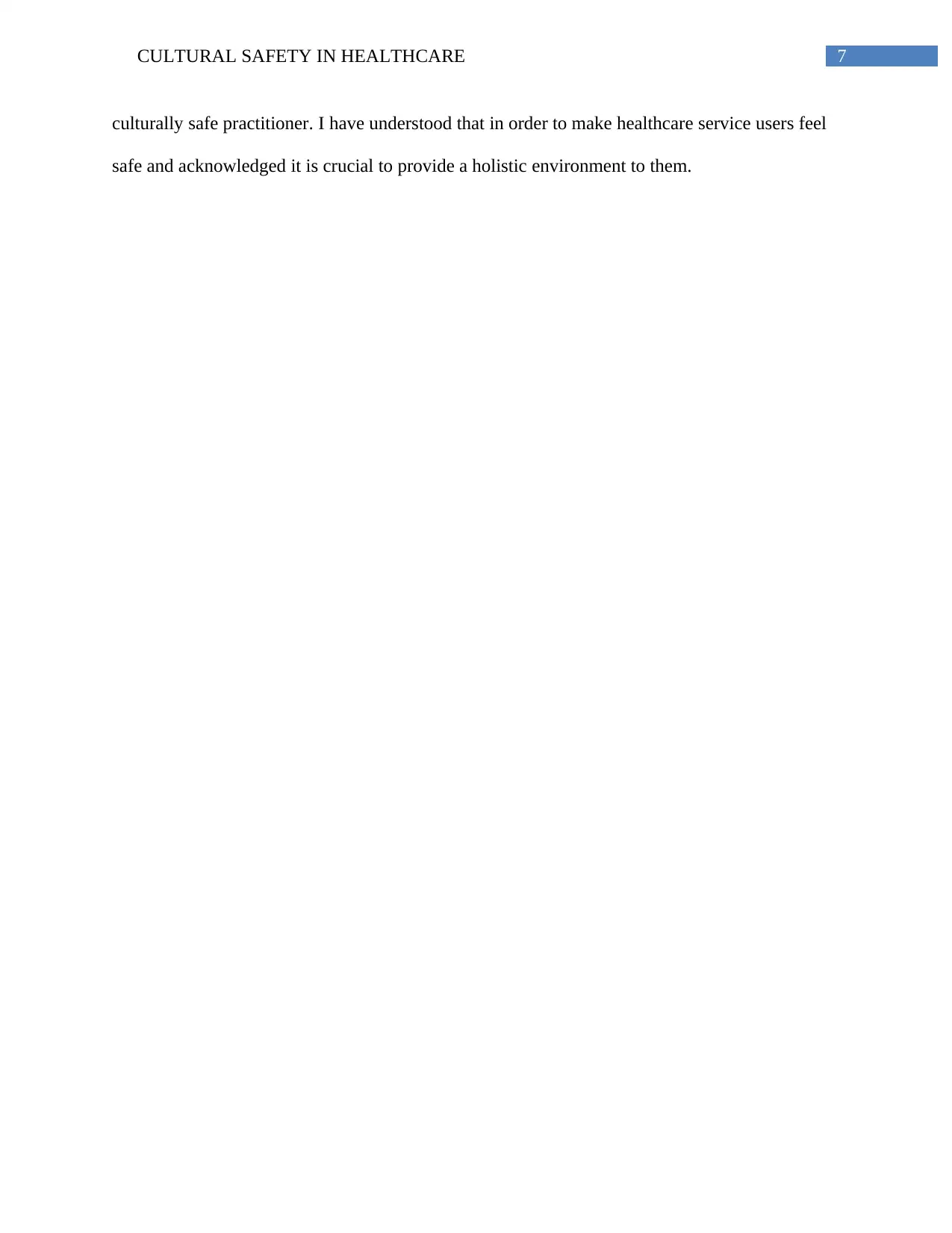
7CULTURAL SAFETY IN HEALTHCARE
culturally safe practitioner. I have understood that in order to make healthcare service users feel
safe and acknowledged it is crucial to provide a holistic environment to them.
culturally safe practitioner. I have understood that in order to make healthcare service users feel
safe and acknowledged it is crucial to provide a holistic environment to them.
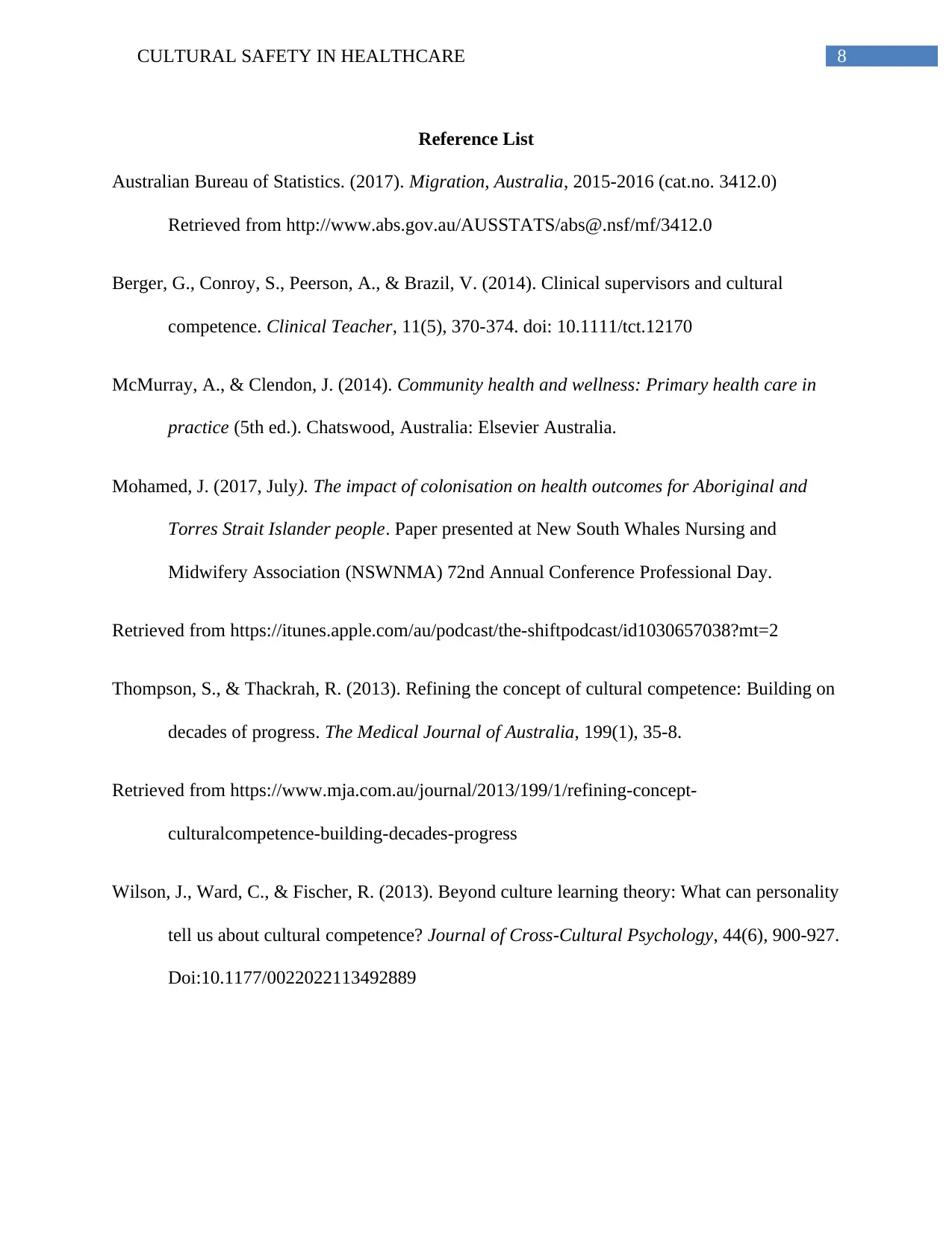
8CULTURAL SAFETY IN HEALTHCARE
Reference List
Australian Bureau of Statistics. (2017). Migration, Australia, 2015-2016 (cat.no. 3412.0)
Retrieved from http://www.abs.gov.au/AUSSTATS/abs@.nsf/mf/3412.0
Berger, G., Conroy, S., Peerson, A., & Brazil, V. (2014). Clinical supervisors and cultural
competence. Clinical Teacher, 11(5), 370-374. doi: 10.1111/tct.12170
McMurray, A., & Clendon, J. (2014). Community health and wellness: Primary health care in
practice (5th ed.). Chatswood, Australia: Elsevier Australia.
Mohamed, J. (2017, July). The impact of colonisation on health outcomes for Aboriginal and
Torres Strait Islander people. Paper presented at New South Whales Nursing and
Midwifery Association (NSWNMA) 72nd Annual Conference Professional Day.
Retrieved from https://itunes.apple.com/au/podcast/the-shiftpodcast/id1030657038?mt=2
Thompson, S., & Thackrah, R. (2013). Refining the concept of cultural competence: Building on
decades of progress. The Medical Journal of Australia, 199(1), 35-8.
Retrieved from https://www.mja.com.au/journal/2013/199/1/refining-concept-
culturalcompetence-building-decades-progress
Wilson, J., Ward, C., & Fischer, R. (2013). Beyond culture learning theory: What can personality
tell us about cultural competence? Journal of Cross-Cultural Psychology, 44(6), 900-927.
Doi:10.1177/0022022113492889
Reference List
Australian Bureau of Statistics. (2017). Migration, Australia, 2015-2016 (cat.no. 3412.0)
Retrieved from http://www.abs.gov.au/AUSSTATS/abs@.nsf/mf/3412.0
Berger, G., Conroy, S., Peerson, A., & Brazil, V. (2014). Clinical supervisors and cultural
competence. Clinical Teacher, 11(5), 370-374. doi: 10.1111/tct.12170
McMurray, A., & Clendon, J. (2014). Community health and wellness: Primary health care in
practice (5th ed.). Chatswood, Australia: Elsevier Australia.
Mohamed, J. (2017, July). The impact of colonisation on health outcomes for Aboriginal and
Torres Strait Islander people. Paper presented at New South Whales Nursing and
Midwifery Association (NSWNMA) 72nd Annual Conference Professional Day.
Retrieved from https://itunes.apple.com/au/podcast/the-shiftpodcast/id1030657038?mt=2
Thompson, S., & Thackrah, R. (2013). Refining the concept of cultural competence: Building on
decades of progress. The Medical Journal of Australia, 199(1), 35-8.
Retrieved from https://www.mja.com.au/journal/2013/199/1/refining-concept-
culturalcompetence-building-decades-progress
Wilson, J., Ward, C., & Fischer, R. (2013). Beyond culture learning theory: What can personality
tell us about cultural competence? Journal of Cross-Cultural Psychology, 44(6), 900-927.
Doi:10.1177/0022022113492889
⊘ This is a preview!⊘
Do you want full access?
Subscribe today to unlock all pages.

Trusted by 1+ million students worldwide
1 out of 9
Related Documents
Your All-in-One AI-Powered Toolkit for Academic Success.
+13062052269
info@desklib.com
Available 24*7 on WhatsApp / Email
![[object Object]](/_next/static/media/star-bottom.7253800d.svg)
Unlock your academic potential
Copyright © 2020–2025 A2Z Services. All Rights Reserved. Developed and managed by ZUCOL.



